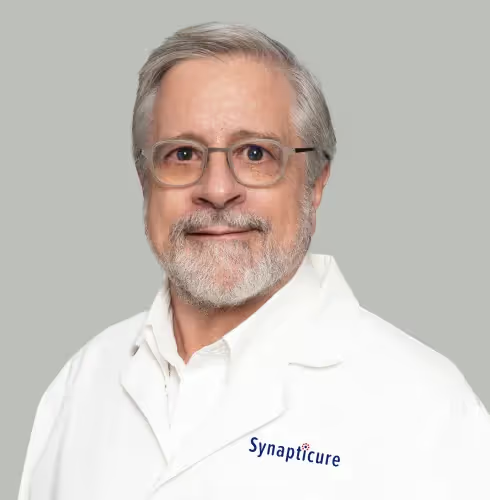Synapticure proudly announces our recently IRB-approved study that focuses on presymptomatic individuals who carry a pathogenic or likely-pathogenic gene variant of ALS. Participants in this study will be given the option to take Riluzole, one of the FDA-approved treatments for ALS. There is no placebo for this study, so all eligible participants will receive the medication.
Who is eligible?
- Anyone 18 years old and older who is a carrier of a pathogenic or likely-pathogenic ALS-associated gene variant and is presymptomatic or asymptomatic. A review by our genetic counselors will determine if the patient carries a variant that meets this criterion.
- You are likely eligible to enroll if you carry a variant in ANXA11, C9orf72, CHMP2B, FUS, SOD1, KIF5A, NEK1, OPTN, PFN1,TARDBP, TBK1, VAPB, VCP, or UBQLN2, or other ALS-associated genes that have been categorized as likely-pathogenic. If you are unsure of any genetic testing results that you have received in the past, please reach out to us.
- If you are concerned about your risk and have not had genetic testing, please reach out to us and we can facilitate genetic counseling and testing as appropriate.
- Patients must be able to meet virtually via a telemedicine platform on a monthly basis with their Synapticure care coordinator, every three months with their Synapticure neurologist and twice yearly with an independent neurologist for a face-to-face visit. This is to ensure the transition to a symptomatic state is caught as early as possible. All Synapticure visits are virtual, so no form of travel is required to participate in this study.
- Patients will be financially responsible for the visits with Synapticure’s clinicians and the medication. Visits may be covered by insurance, may require a co-pay or may be an out-of-pocket expense. Synapticure will be responsible for submitting a bill to your insurance company. The co-pay for most Synapticure patients falls between $0-40 per visit, and we estimate medication will cost less than $20 per month.
Why is this important?
- We see an urgent need to identify effective presymptomatic ALS treatments that may delay the onset of ALS symptoms or help prevent them completely.
- It is widely accepted among the neurology community that the disease process in ALS begins years before the onset of overt symptoms. With the identification of pathogenic variants, we may have a window of opportunity to start treating patients in the presymptomatic phase of the disease’s natural progression.
- There are no officially recognized treatments for presymptomatic gene carriers and while there are studies working with specific genetic subtypes, they do not encompass all known pathogenic variants.
- No study has examined treatments that are currently FDA-approved in presymptomatic ALS. Riluzole was the first disease-modifying ALS therapy that the FDA approved in 1995. With almost 30 years of use in the general ALS population, its efficacy, side effect profile, and tolerance has been well-established, but has not been studied in a presymptomatic or asymptomatic population. This, in addition to its relatively low cost (approximately $13.00 for a one month supply at select pharmacies), makes it a good candidate for a medication that can be studied in presymptomatic individuals.
"In 2020, my mom died of C9orf72 ALS. For the last three years, I've cried tears of frustration and grief when I've thought about my family's gene mutation. For the first time, I'm crying tears of joy. This observational study for premanifest gene carriers like me is a game-changer. It could potentially buy me time and give my kids hope for a future without ALS."
-Mindy Uhrlaub
Why this study? Why now?
- Synapticure not only seeks to understand the tolerability and potential efficacy of Riluzole in presymptomatic gene carriers, but also seeks to build a better understanding of the presymptomatic disease state for future trials and research.
- We sought IRB approval for this study to make sure that an independent assessment of the study confirms that it is ethical and in accordance with three key principles of human research studies: respect of human persons, beneficence, and justice.
- Several months ago, we opened our doors to presymptomatic carriers of pathogenic gene variants to ensure that these patients had regular follow up and guidance. Those patients will still be welcome to enroll with Synapticure regardless of whether they choose to participate in the study. Study participation is completely voluntary.
- It is not only important to offer treatment, but to also collect and analyze that data. If there is a medication that is FDA-approved and may prevent phenoconversion or modify the progression of the disease favorably once a patient becomes symptomatic, then this is crucial information that may change the presymptomatic management paradigm.
If you are a presymptomatic pathogenic gene carrier and are interested in enrolling or if you know someone who is, please contact us today!
If you want to learn more about this study, click here to view the frequently asked questions.











.png)


